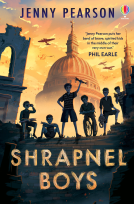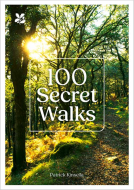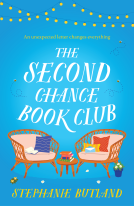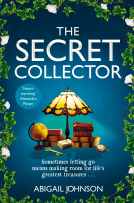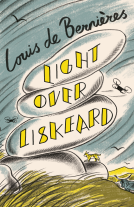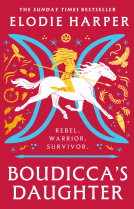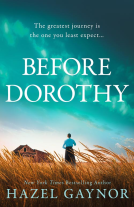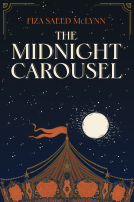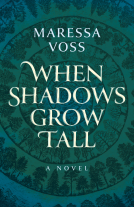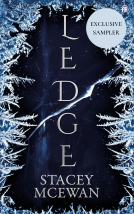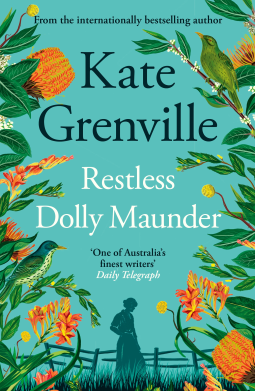
Restless Dolly Maunder
by Kate Grenville
This title was previously available on NetGalley and is now archived.
Send NetGalley books directly to your Kindle or Kindle app
1
To read on a Kindle or Kindle app, please add kindle@netgalley.com as an approved email address to receive files in your Amazon account. Click here for step-by-step instructions.
2
Also find your Kindle email address within your Amazon account, and enter it here.
Pub Date 3 Sep 2024 | Archive Date 25 Apr 2024
Talking about this book? Use #RestlessDollyMaunder #NetGalley. More hashtag tips!
Description
The Women's Prize-winning and Booker-shortlisted international bestselling author returns with a fictionalised account of her grandmother's life
Dolly Maunder is born at the end of the nineteenth century, when society's long-locked doors are just starting to creak ajar for determined women. Growing up in a poor farming family in rural New South Wales, Dolly spends her life doggedly pushing at those doors. A husband and two children do not deter her from searching for love and independence.
Restless Dolly Maunder is a subversive, triumphant tale of a pioneering woman working her way through a world of limits and obstacles, who is able – despite the cost – to make a life she could call her own.
Advance Praise
‘A work of history, biography, story and memoir, all fused into a novel that suggests the great potential of literary art as redeemer, healer and pathway to understanding . . . the writing sparkles with Grenville’s gift for transcendently clear imagery’
Guardian
‘Vivid and memorable . . . [Kate Grenville] offers us the ambivalence and complex textures of experience without losing the rhythm and pace of realist fiction’
SARAH MOSS, Times Literary Supplement
‘A powerful novel about a woman determined to rise above her station . . . A privilege to share in Grenville's indomitable grandmother's journey’
The Times
‘Grenville . . . tells Dolly's story swiftly, cleanly and compassionately, all the while refusing to let this difficult, furious woman off the hook. Excellent’
Daily Mail
‘The masterful Grenville addresses the question of why this brilliant, frustrated woman struggled to express love to her children with clarity and compassion in a swift, thoroughly absorbing book’
Mail Online
‘A memorable portrait of a proto-feminist determined to free herself from society’s expectations’
Sunday Times
‘Grenville astutely portrays the friction between the heroine and her daughter, who is stung by her mother’s steely reserve – perhaps because she can’t see the life story we’ve just read’
Mail on Sunday, Best New Fiction
‘Brings readers into intimate acquaintance with the lives of women in late 19th- and early 20th-century rural Australia . . . elevated by Grenville's crystalline prose’
Globe and Mail
Praise for Kate Grenville:
‘Beautifully written, insistently eloquent and expressive of connection . . . [a] stunning literary achievement’
Guardian
‘Kate Grenville spins a delicately teasing novel about the inherent untrustworthiness of the official record . . . beautiful and subtle’
Financial Times
‘Grenville cleverly uses Elizabeth’s bland and pleasant missives home, showing that they were a carefully constructed fiction. The real Elizabeth — passionate, clever and endlessly resilient — is brilliantly conjured’
The Times
‘Kate Grenville gives voice to this reticent woman, allowing her smart, sparky, shrewd heroine a chance “at last to speak” . . . eloquent [and] evocative’
Daily Mail
Available Editions
| EDITION | Paperback |
| ISBN | 9781805302506 |
| PRICE | £9.99 (GBP) |
| PAGES | 256 |
Available on NetGalley
Featured Reviews
 Andrea B, Educator
Andrea B, Educator
I have loved Kate Grenville since I read 'Joan Makes History' when it first came out. Since then I've become an expat Australian who reads Grenville out of loyalty and homesickness. She builds the smells and sounds of Australia with authenticity and without cliché and I can almost feel the warmth of the 'sunburnt country' that she lovingly builds.
Ostensibly this is another of her great Historical Fiction novels about wonderfully strong, slight rebellious nineteenth and early twentieth century women. However, this has a biographical element as well. Dolly Maunder is Grenville's grandmother, her mother's mother and she has a couple of vague memories of the grumpy old woman who came to stay with her family when she was still small. In the afterward, she recounts having done a lot of research into her maternal relatives when she wrote about her mother in 2015. But what she found out and her mother's memories did not fully gel. Grenville guessed there needed to be more to this distant, restless woman who seemed so disconnected from her daughter.
What has resulted is a brilliantly imagined story of her grandmother fighting the colonial destiny of her foremothers. Marriage and motherhood was her assigned lot and restless Dolly Maunder (Russell) fought back against it. She was clever, routinely winning 'Star of the Week' in the government school that new laws meant that she had to attend until she was fourteen. At this age, she was desperate to train as a teacher but 'over my dead body' was her father's reply. No daughter of his was going out to work when there was so much to do on the farm. And so Dolly's fortune was apparently sealed.
But this closed small life was not what she wanted and her ambition and drive see her and her family travel around New South Wales in search of greater and greater economic challenges. They buy a shop and then a boarding house, and then a series of pubs. But along the way she worries that he raising is influencing the way that she is raising her own children.
A brilliantly compelling novella of family and one woman's ambition to experience more of life that she's allowed to.
Highly recommended.
Born at the end of the 19th century, Dolly Maunder was born at a time when women were just starting to have more social mobility. In the face of her poor childhood on a farm in New South Wales, Dolly consistently tries her best to break through the increasingly frail barriers on her way to finding independence and fulfilment.
I think the fact that Dolly Maunder was the author's grandmother really shines through the story because the writing has so much tenderness and sympathy for her, despite Dolly not being a particularly warm character. Although I did read Grenville's closing words, I'm still unsure how much is fiction and how much is family legend. One thing that really stood out for me was the connection between her very restricted, sheltered beginnings and her insatiable wanderlust and search for something new. She is constantly wanting to move on from her situation -even when it's very comfortable- and I think that's a hangover from when she couldn't escape her father's farm.
In some ways, it's a tragic story of a woman who was never satisfied with her lot but in other ways, it's a celebration of a woman of her time. It was really inspiring to see that Dolly's daughter (Grenville's mother) did manage to juggle a career and family in a way that Dolly never could. It certainly ends on a hopeful note that women will continue to flourish.
'Restless Dolly Maunder' is an outstanding work of historical fiction by Kate Grenville which is once again based on her family history - in this instance, her own grandmother of whom she has only distant memories. It follows Dolly as she refuses to be confined by the social constraints of early 20th Century Australia.
 Lyn B, Reviewer
Lyn B, Reviewer
Kate Grenville is one of my favourite Australian authors, and she has a way of bringing history to life. I enjoyed this depiction of her grandmother's life, with all the constraints women faced at the time, as well as the difficulties of living through two world wars and the Depression. Due to class and religion, she ends up in a less than ideal marriage and the consequences that follow from that impact on her children. Her drive and ambition for herself and her children was amazing. I am always glad that I was born in this time and had so many opportunities, and it is good to be reminded that not everyone has been or is that lucky. Thanks to NetGalley for an advance copy to review.
 Sarah B, Reviewer
Sarah B, Reviewer
I have had a number of Kate Grenville's books on by "to-be-read" list for some time, so I was excited to see Restless Dolly Maunder on the Women's Prize for Fiction longlist, which gave me the prompt I needed to finally get up to reading some of her work.
This was a spare but impactful account of one woman's life spanning the late 19th and early 20th centuries in Australia. Dolly's determination and what she achieved was inspirational, but Grenville does not shy away from exploring the cost of this for her and her family. I was aware of the family connection between Grenville and Maunder before I started reading (if I was not, I think the final chapters would have come as a pleasant surprise and changed my perspective on the novel). I very much appreciated Grenville's explanation of why she wrote the book and the novel is certainly an interesting way of thinking through some of the relationships between her family members and considering things from an alternative perspective.
The book does not linger anywhere too long (perhaps a deliberate choice that is reflective of Dolly's own restlessness). For me, this made it harder to relate to any of the characters and to really get under their skin. With that in mind, I would have enjoyed staying a little longer in Dolly's wider world and reading a bit more detail about the time and place since what I did read was fascinating.
I'll certainly be seeking out more of Kate Grenville's books and look forward to reading more. Thank you to NetGalley and the publisher for a free advance copy of the book in exchange for an honest review.
 Rachel L, Reviewer
Rachel L, Reviewer
Restless Dolly Maunder is the fictionalised life of the author’s grandmother, using real dates and places but adding her view of how her grandmother‘s life and character is shaped by the times and conventions, being born in the early 1880s, in rural Australia. The book is straightforward, there is a linear timeline. All we learn about Dolly is solely from her character’s point of view.
While reading I really wanted
more dialogue! Others’ points of view! Three quarters of the way through I felt rather bored; there are no surprises and it began to feel predictable. If you have some knowledge of historical world events then what happens to Bert, Dolly and their family is inevitable.
It is not the most scintillating story. While reading I kept thinking of the character of Rudge in Alan Bennett The History Boys:
“How do I define history? It's just one fucking thing after another.”
However, coming to the end of the book and the photograph and afterword, I feel somewhat differently. I did not know when I began reading that it was a fictionalised biography of the author’s grandmother. It made me look at the book in a different light. I really respected Kate Grenville as an author already, having read several of her other books over the years. Her writing is so clear and spare. Every word is like a pebble dropped into still water; there is nothing frilly, or unnecessary to tell the story. This is a really thoughtful account, without any sentimentality whatsoever, to explore her grandmother‘s life. It also examines the contexts of women’s lives who were being tamped into the same moulds, whether they fit into them willingly or not. There is a strong sense of lives which were lived as time moved into a new century, and how they were partly shaped by tumultuous world events.
Thank you to Netgalley and the publisher for the opportunity to read an advance copy.
 Sarah T, Reviewer
Sarah T, Reviewer
I love a Kate Grenville book - a bit of Australia, history and usually a strong female character. This book delivers on all those accounts with the added twist of it being based around the life of the author's grandmother. It is the tale of a woman fighting against society's expectations for women as well as the disappointment of her marriage and feelings towards motherhood.
It is a good read but I felt that by basing the tale on a person known to the author she has then been restricted by her knowledge. The text did not flow in the same way that it does in her previous books. The regularity with which Dolly moves on makes some situations seem repetitive. However the heart breaking relationship with her daughter, torn between love and jealousy, more than made up for these minor quibbles.
 Marianne V, Reviewer
Marianne V, Reviewer
4.5★s
Restless Dolly Maunder is the eleventh novel by award-winning Australian author, Kate Grenville. In the late nineteenth Century, Sarah Catherine Maunder is born, the sixth and second-last child of Thomas and Sarah Maunder. She’s quickly known as Dolly by everyone on Forest Farm and in the town on Currabubula. She is lucky enough to have a school teacher who is strict about attendance, recently made compulsory, and enjoys school and learning.
Theirs is a hard, simple life, but at her aunt’s house, “a special pair of scissors just for cutting grapes … told her something important: there was a world beyond the one she knew.” Dolly is smart enough to entertain becoming a pupil-teacher, but that grandiose idea is quickly vetoed by her father: when she leaves school at fourteen, she will be needed on the farm. She soon understands that a life of endless, repetitive chores awaits her, chores that must be done to a standard that pleases her mean father, if she is to avoid punishment.
“Girls were of no account, you learned that early on. Good enough to make the bread and milk the cow, and later on you’d look after the children. But no woman was ever going to be part of the real business of the world.”
“What could a woman do but marry, and once you were married you belonged to your husband’s world and had to turn your back on your own. It wasn’t betrayal. It was the way the world was.” Dolly observes “A beautiful woman might have a bigger choice of men. But she had to pick one, and whichever one she picked, she’d still end up a wife, with a life as small as the plainest Plain Jane’s.”
The alternative, remaining a spinster, didn’t bear thinking about: “… their moment had passed, the wave they might have ridden into marriage had broken and ebbed into a bit of foam and washed them up in a back street in Curra with nothing and no one.” So Dolly marries Bert Russell, and they take up sheep farming in Rothesay.
But soon enough Dolly realises that success at farming is at the mercy of the weather. A hailstorm decides it for her: a little shop in Wahroonga is a much better bet. But once that is running well, Dolly finds herself looking for more: before long, she also runs a boarding house in Newport. And from there, a series of pubs get the Dolly and Bert treatment: hard work, improvement, profit. But “…the old restlessness: it seemed to be dyed deep in the fabric of who she was, her need to keep moving.”
Eventually, Dolly has the insight to see that “A woman … couldn’t take her future in her own hands and shape it in the way she wanted. Couldn’t even be a teacher if she wanted, and that was surely a humble enough thing to wish for.” She and Bert weather adverse natural phenomena, a global financial crisis and a world war, noting “You could do your best, but if life wanted to pull the rug out from under you it would find a way to do it.”
She also comes to acknowledge to herself her inability to connect with her children: “She heard herself sliding the pointed tip of sharp remarks at him… somehow she’d let all her own hurts be made into that weapon, and she’d turned it outwards against Frank in particular, the baby of the time of betrayal. He’d grown a surface to deflect the blade, but eventually it had found a place to slip in.”
Basing her novel on the life of her maternal grandmother, Grenville gives the reader a fabulous collision of reality and imagination, interweaving fact with fiction, all of it rich in historical detail, with a marvellously diverse cast of real people and (probably) fictional characters. It does feel like her intention to understand this enigmatic woman is realised.
As always, Grenville renders her era and setting with consummate ease, and descriptive prose is exquisite. A few examples: “Her red curly hair like a shining river glinting with light” and “It gave him a special bitter satisfaction to go over and over the stories of his humiliations … Dolly’s father told over the hurts like jewels, turning them in his memory so they flashed with his anger” and “His life had curved in towards hers, just for that moment, but curved away again like railway tracks, two sets of rails travelling towards different places.”
Only Grenville’s choice to omit quote marks for speech, at times causing confusion, prevents a higher rating. Brilliant Australian historical fiction.
This unbiased review is from an uncorrected proof copy provided by NetGalley and Canongate Books
 Librarian 1146347
Librarian 1146347
Dolly Maunder is one of the younger children of a family living in a small Australian town in the late 19th century. Unlike her older brothers and sisters, she gets the chance of an education and proves to be very bright, but her bullying father refuses to let her stay on at school to become a teacher and instead makes her leave at 14 to help at home. The rest of the novel tells of Dolly straining against the expectations placed on her and fighting to improve her lot in life.
The book is a novel but based as closely as can be on the life of the author’s grandmother, using archive material and conversations with the author’s mother (Dolly’s daughter). Dolly herself is an intriguing character, never really likeable but very impressive. Her frustration at the limits placed on women is clear and it’s a real insight into how difficult it was for women to change their circumstances (my own great grandmother was born in the north of Scotland at a similar time and it’s fascinating to see how alike their lives were). The grind of the everyday work, the sheer amount of time and effort it all took, the limited choices and lack of opportunity to make decisions for yourself, or have a way out when needed, is beautifully portrayed.
This is the first work by Kate Granville that I’ve read and I loved it, her writing is so natural and she manages to make many deeper points about society without ever taking away from the story, which was completely engrossing. I’ll certainly be looking out for more of her work.
Thanks to Netgalley and the publisher for an advance copy in return for an honest review.
Readers who liked this book also liked:
Jenny Linford; National Trust Books
Cooking, Food & Wine, History, Travel
Patrick Kinsella; National Trust Books
Health, Mind & Body, Outdoors & Nature, Travel


